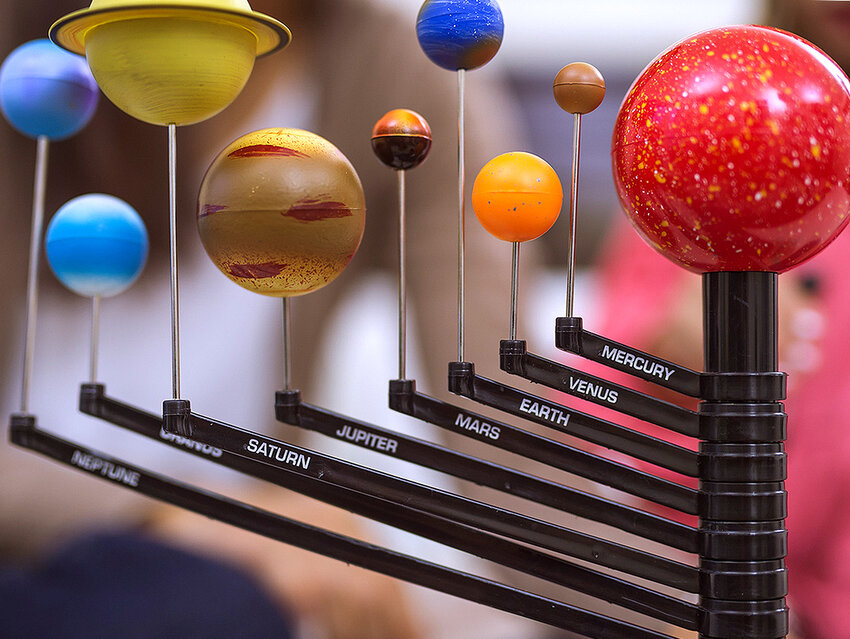English has borrowed plenty of words from other languages, but some concepts are the same across many world languages. Looking up at the heavens, most Western languages use a similar set of planet names, the majority of which were adopted from the names of Roman and Greek gods. Mercury, Venus, Mars, Jupiter, and Saturn are the brightest planets in the night sky, so they were the first to be noticed and named.
Centuries later, the advent of the telescope allowed for further exploration of the skies, and the Greco-Roman language tradition of adopting deity names continued. Neptune, the Roman god of the seas, and Uranus, the Greek god of the heavens, were added to the pantheon. Even Pluto, which was demoted to dwarf planet status in 2006, is named for the Greek god of the underworld. Earth is the only planet name in English that was not inspired by a deity. It was derived from the Old English and Germanic words for “ground” and “soil.”
Greco-Roman Planet Names in Modern Language
Most modern languages have kept the Greco-Roman planet names, including all major Romance languages (such as French, Italian, Portuguese, Spanish, and Romanian). French uses the names Mercure, Vénus, Terre, Mars, Jupiter, Saturne, Uranus, and Neptune. Similarly, in Portuguese, the planets in order from the sun are called Mercúrio, Vênus, Terra, Marte, Júpiter, Saturno, Urano, and Netuno. The major Germanic languages of English, German, Dutch, Swedish, and Afrikaans also use variations on these names. In Dutch, for example, the planets are called Mercurius, Venus, Aarde, Mars, Jupiter, Saturnus, Uranus, and Neptunus.
“Earth” Is Different
You might notice the only major difference in planet names is the word for “Earth,” which was never given a Greco-Roman deity name. Instead, it usually translates to a word for “ground” or “soil” — the Italian word for Earth is “Terra,” and the Albanian word is “Toka.” One of the few languages that strays from this practice is Navajo, which uses the word “Nahasdzáán” (“our woman”), which loosely translates to a “Mother Earth” concept. The rest of the Navajo planet names were adopted from the Greco-Roman influence, including Mókiwii (Mercury), Biinis (Venus), Máaz (Mars), Jíbitoo (Jupiter), Saturn (Séetin), Yoowéinis (Uranus), and Néʼtoon (Neptune).
In 2021, NASA’s Perseverance rover team partnered with the Navajo Nation to develop a list of Navajo words to use for naming rocks and other scientifically significant objects on Mars. The first rock to be studied by Perseverance was aptly named Máaz.
Eastern Influences: Naming by Elements
Languages that don’t follow Greco-Roman traditions are often from ancient civilizations; many such languages predate Greek and Latin (including Arabic, Hebrew, Japanese, and Hindi). Inspiration for the planetary names in these languages came from other deities, natural elements, or characteristics of the celestial bodies themselves. The brightest planets tend to have names that are grouped together, followed by others that were named once technology improved astronomy studies.
Many East Asian languages use elements to designate the planets. Under the Chinese Wǔ xíng philosophy, there are five elements that impact everything in the universe: water, metal, fire, wood, and earth (as in soil), which were used to name those five brightest stars in the sky. The character 星 stands for “star” or “planet,” which is why it is seen in all of these planet names aside from “Earth.” Other Asian languages, such as Japanese and Korean, also use these same elements to name the planets, all likely derived from the original Chinese names. Note that Japanese and Chinese use the same characters but implement very different pronunciations.
- Mercury: Water Star
Chinese: 水星 (Shuǐxīng); Japanese: 水星 (Suisei); Korean: 수성 (Suseong)
- Venus: Metal or Gold Star
Chinese: 金星 (Jīnxīng); Japanese: 金星 (Kinsei); Korean: 금성 (Geumseong)
- Earth: Ball of land
Chinese: 地球 (Dìqiú); Japanese: 地球 (Chikyū); Korean: / 지구 (Jigu)
- Mars: Fire Star
Chinese: 火星 (Huǒxīng); Japanese: 火星 (Kasei); Korean: 화성 (Hwaseong)
- Jupiter: Wood Star
Chinese: 木星 (Mùxīng); Japanese: 木星 (Mokusei); Korean: 목성 (Mokseong)
- Saturn: Soil Star
Chinese: 土星 (Tǔxīng); Japanese: 土星 (Dosei); Korean: 토성 (Toseong)
- Uranus: King of the Heaven Star
Chinese: 天王星 (Tiānwángxīng); Japanese: 天王星 (Tennousei); Korean: 천왕성 (Cheonwangseong)
- Neptune: King of the Sea Star
Chinese: 海王星 (Hǎiwángxīng); Japanese: 海王星 (Kaiousei); Korean: 해왕성 (Haewangseong)
- Pluto: King of the Underworld/Afterlife Star
Chinese: 冥王星 (Míngwángxīng); Japanese: 冥王星 (Meiousei); Korean: 명왕성 (Myeongwangseong)
Featured image credit: FatCamera/ iStock

